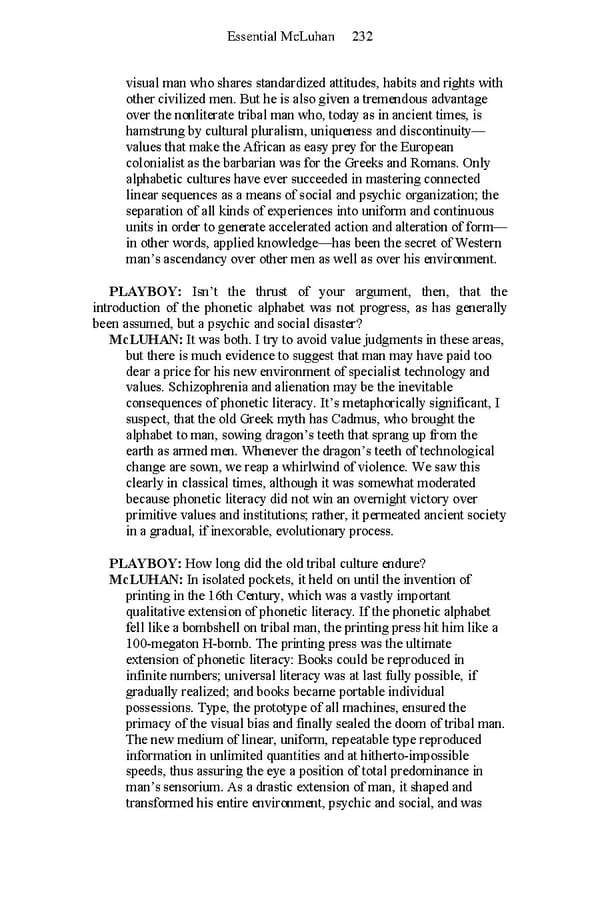Essential McLuhan 232 visual man who shares standardized attitudes, habits and rights with other civilized men. But he is also given a tremendous advantage over the nonliterate tribal man who, today as in ancient times, is hamstrung by cultural pluralism, uniqueness and discontinuity— values that make the African as easy prey for the European colonialist as the barbarian was for the Greeks and Romans. Only alphabetic cultures have ever succeeded in mastering connected linear sequences as a means of social and psychic organization; the separation of all kinds of experiences into uniform and continuous units in order to generate accelerated action and alteration of form— in other words, applied knowledge—has been the secret of Western man’s ascendancy over other men as well as over his environment. PLAYBOY: Isn’t the thrust of your argument, then, that the introduction of the phonetic alphabet was not progress, as has generally been assumed, but a psychic and social disaster? McLUHAN: It was both. I try to avoid value judgments in these areas, but there is much evidence to suggest that man may have paid too dear a price for his new environment of specialist technology and values. Schizophrenia and alienation may be the inevitable consequences of phonetic literacy. It’s metaphorically significant, I suspect, that the old Greek myth has Cadmus, who brought the alphabet to man, sowing dragon’s teeth that sprang up from the earth as armed men. Whenever the dragon’s teeth of technological change are sown, we reap a whirlwind of violence. We saw this clearly in classical times, although it was somewhat moderated because phonetic literacy did not win an overnight victory over primitive values and institutions; rather, it permeated ancient society in a gradual, if inexorable, evolutionary process. PLAYBOY: How long did the old tribal culture endure? McLUHAN: In isolated pockets, it held on until the invention of printing in the 16th Century, which was a vastly important qualitative extension of phonetic literacy. If the phonetic alphabet fell like a bombshell on tribal man, the printing press hit him like a 100-megaton H-bomb. The printing press was the ultimate extension of phonetic literacy: Books could be reproduced in infinite numbers; universal literacy was at last fully possible, if gradually realized; and books became portable individual possessions. Type, the prototype of all machines, ensured the primacy of the visual bias and finally sealed the doom of tribal man. The new medium of linear, uniform, repeatable type reproduced information in unlimited quantities and at hitherto-impossible speeds, thus assuring the eye a position of total predominance in man’s sensorium. As a drastic extension of man, it shaped and transformed his entire environment, psychic and social, and was
 Essential McLuhan Page 238 Page 240
Essential McLuhan Page 238 Page 240